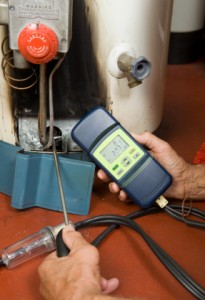Heating Safety in the Home
 During the winter months it’s important to have alternative ways to heat your home in case the power goes or you lose utilities that provide heat. Many people turn to alternative sources for heat including fireplaces, woodstoves, kerosene heaters and space heaters. But before you turn to any one of these alternative sources of heat, it’s important to understand the safety issues you need to consider.
During the winter months it’s important to have alternative ways to heat your home in case the power goes or you lose utilities that provide heat. Many people turn to alternative sources for heat including fireplaces, woodstoves, kerosene heaters and space heaters. But before you turn to any one of these alternative sources of heat, it’s important to understand the safety issues you need to consider.
One of the greatest concerns involved with the use of alternative heating sources is the risk of death by carbon monoxide poisoning or fire. You can prevent these tragedies from happening in your home if you educate yourself and pay attention to the sources of heat you are using. Following safety tips will ensure your family stays warm during winter’s cold months.
Make Safety a Priority
Above everything else, make safety a priority when using alternative sources of heat for your home. You need to pay attention to these sources of heat and confirm that your house is free of carbon monoxide. A simple way to do this is to purchase a carbon monoxide detector and place it in a few prominent locations in your home. Confirm the batteries are operational to ensure it is working when you need it. Follow these safety tips to avoid home fires and heating accidents:
- Keep children away from all alternative sources of heat.
- Ensure all fuel-burning heaters are correctly vented. This includes propane, natural gas, kerosene, oil and butane.
- Do not use a cooktop or kitchen oven to heat your home. Besides being a fire hazard, toxic fumes can be released without you knowing about them.
- Refuel heaters outdoors; don’t let the noxious fumes inside the home.
- Check space heaters for U.L. certification; ensure safety features are built into the space heater in case of an accident or the device tips over.
- Don’t use extension cords to run space heaters—this can become a source of fire.
- Check all smoke and fire alarm batteries to ensure they are functional. Test the alarms once a month during the winter and change the batteries once a year.
Heating Equipment Safety Checks and Servicing
Service your furnace annually to ensure that it is functional. If there is something wrong with your main furnace, it can emit toxic fumes in your home without you being aware of it. If these fumes escape while you are sleeping, the results can be deadly. Check all your heating equipment and ensure it is operational and safe before using it to heat your home.
- Clean and service all filters that attach to your heating and ventilation system for your home.
- Have your furnace serviced annually just before the winter to confirm that it is safe and operational. Replace any malfunctioning equipment immediately.
- Ensure your chimney is clean of debris. Have the chimney flue cleaned every year after burning in your fireplace or woodstoves. Chimney fires can lead to house fires.
- Don’t burn anything but seasoned wood for fuel. Don’t burn wood that is painted or treated with chemicals.
- Keep combustible items, such as drapes, curtains, rugs and more away from heat sources.
Keep extra blankets and quilts available and use these at night to save on heating costs. While keeping the home warm during the winter is a priority, when you’re sleeping you don’t need as much heat in the home. Always have an extra supply of blankets on hand for emergencies.
Check out these Internet resources for more information on ensuring a safe and warm winter:
- USFA Fire Heating Safety – The U.S. Fire Administration details how you can be safe in your home by offering tips and information on heating safety.
- Winter Weather Warnings – The U.S. Product Commission Safety organization advises you on how to use heating equipment safely during winter’s harsh weather.
- Safe Home Heating – Home fires often occur in winter due to fault heating equipment, unsafe practices and more. Follow these tips to make your home safe during the winter.
- Checklist for Home Heating Safety – Use this checklist and fact sheet to ensure your home is safe when using heating equipment.
- Home Heating Safety Tips – The City of Albuquerque offers homeowners tips on staying safe during the winter months.
- Portable Heaters – What you need to know to stay safe when using portable heaters in the home.
- Fireplaces and Wood Burning Stoves – Fireplaces and wood burning stoves need clearance for safe operation.
- Cold Weather Safety – Tips on keeping safe and warm during winter’s months in or out of the home.
- Furnace Heating Safety Tips – Things you need to check to ensure your furnace operates safely during winter’s heating months.
- Space Heaters Fact Sheet – What you need to know about space heaters and how to be safe when using them.
- Chimney Safety – The Top Ten Tips for Wood burning and Chimney Safety from the Chimney Safety Institute of America.
